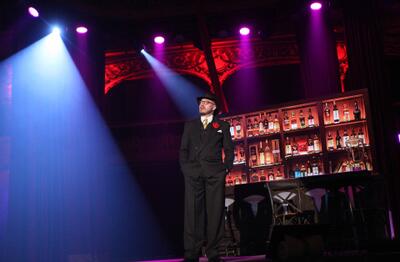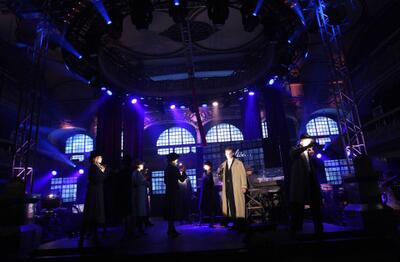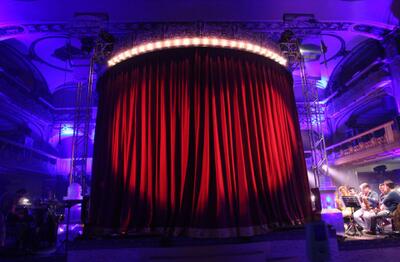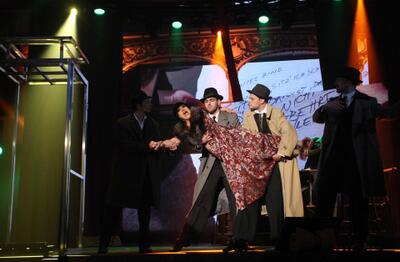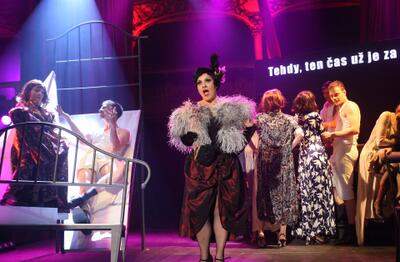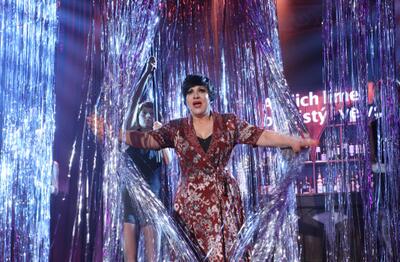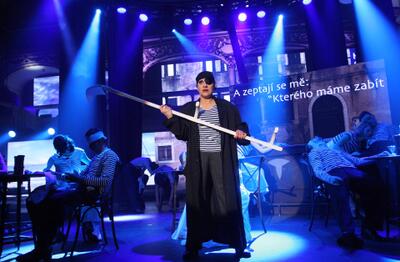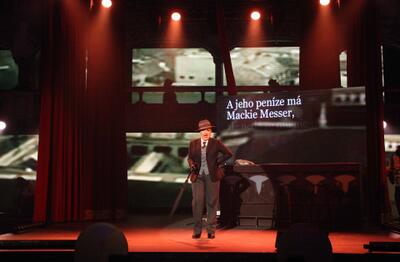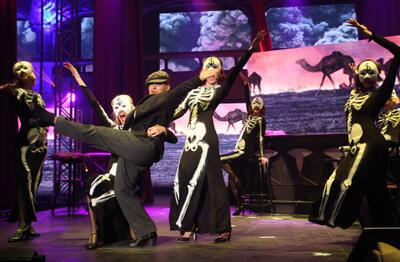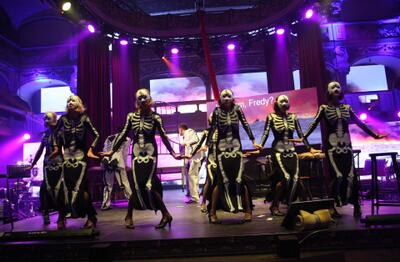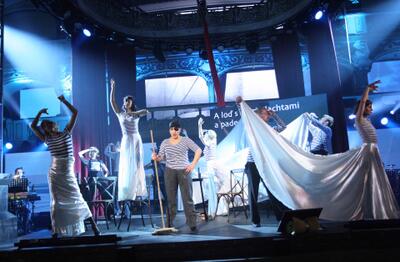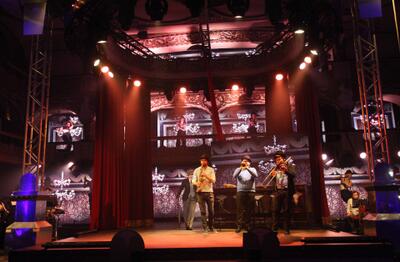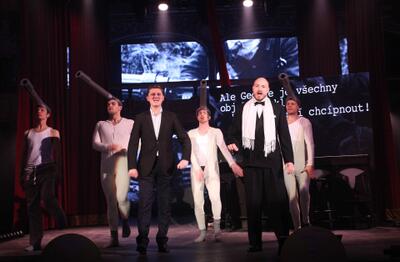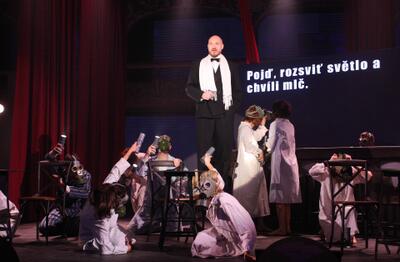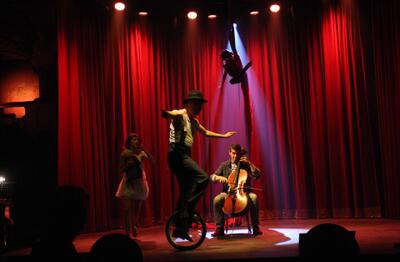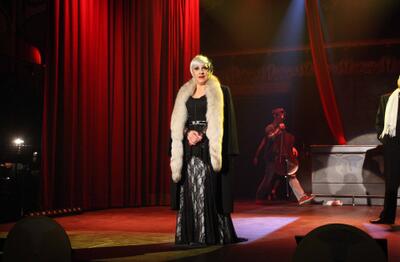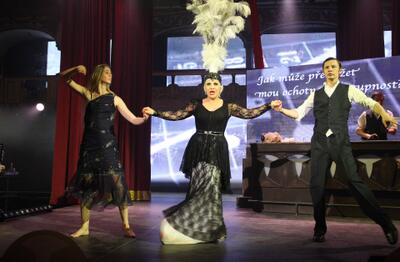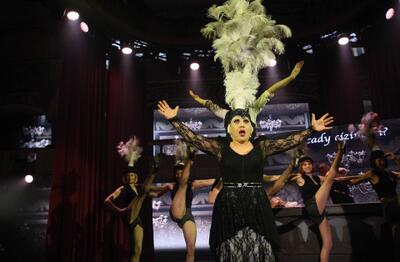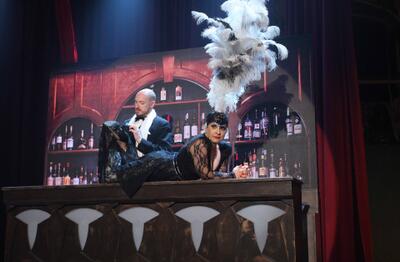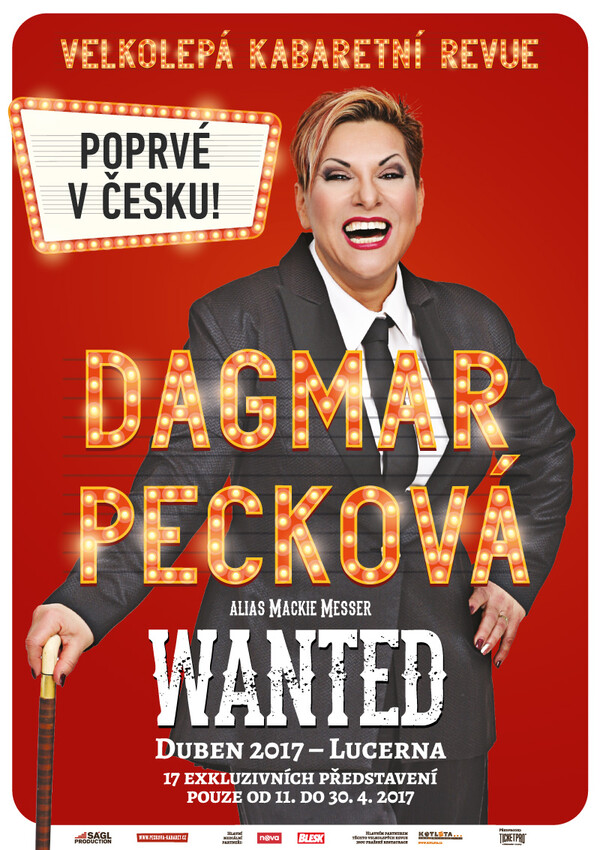
Dagmar Pecková - Wanted
alias Mackie Messer
GRAND CABARET REVUE
W A N T E D
LUCERNA – April 2017
17 exclusive performances
ČESKY ENGLISH DEUTSCH FRANÇAIS РУССКИЙ 中文
Cast:
DAGMAR PECKOVÁ, JIŘÍ HÁJEK, JAN KUČERA, EPOQUE QUARTET & ORCHESTRA, MIROSLAV HLOUCAL JAZZ BAND, MARTA TRPIŠOVSKÁ, MICHAL VODENKA and many more…
Music: KURT WEILL
Conductor: JAN KUČERA
Producer: TOMÁŠ SÁGL
Scenario, setting, director: CABANI
Dagmar Pecková, Jiří Hájek, Jan Kučera, Epoque Quartet & Orchestra, Miroslav Hloucal Jazz Band, Marta Trpišovská, Michal Vodenka... these are names long known on world stages. When we mentioned them to anyone, often we received a sigh, how great it would be to get such great personalities and orchestras on one stage in an extraordinary concert. It is almost unbelievable that we have managed to assemble seventeen such performances with these major performers! And regarding the uniqueness of the topic and the famous setting by the Caban brothers, I would like to add this: Something amazing has been prepared that has not yet been seen in the Czech Republic.
The eponymous CD Wanted recorded by the mentioned artists is to be released in April 2017.
All visitors to the Lucerna performance will be able to buy it in advance before it is distributed, at half price.
Each copy will be signed by Dagmar Pecková.
Questions for the director Michal Caban.
When you say cabaret, everyone immediately thinks of the cancan, Moulin Rouge. Will this be such a kind of cabaret? What could you tell us about the setting?
It won‘t be the Moulin Rouge, but it will have a lot in common with French cabaret or a place of entertainment which cannot be strictly defined, limited or pigeon-holed.
We could say that we focus more on an expressiveness and artistry approaching the Berlin cabaret of the 1920s. But that would not be entirely true. Our colourful revue will actually be a cabaret of the 21st century. Each scene will cry, some will be a bit unfair, projection as the dominant element of the setting will blur the line between reality and fantasy, velvet will caress, sharp and not only dance movements will awake, the voice of Dagmar Pecková will bewitch. And everyone will laugh and cry, clap, whistle and stomp, dream and have fun.
A few words about the topic of the WANTED cabaret revue
Nowadays, many artists raise the question of how to bring “serious” music to more people. This gives rise to all sorts of crossovers hovering between operas and symphonies, artistically more or less valuable. But let‘s just wander back to the interwar period of the 20th century and we find someone who actually did this: Kurt Weill.
He left the pomp and affectation of late Romanticism in concert halls and salons and wrote original music for the “ordinary” man who after the horrors of the First World War just wanted to live a carefree life.
Together with the phenomenal author of texts, Bertolt Brecht, he discovers the world of the criminal gallery, Berlin taverns and brothels, and tells the story of just such people. However, due to his Jewish origins he had to leave Berlin and Germany in the early 30s. He thus continued composing in France, later in America, and each of these countries appropriated Kurt Weill and pretended he was their own artist. The thing is that he knew exactly how to quickly and thoroughly penetrate the system of “their music” and write as beautiful French chansons as great musicals in America in the 40s, from which his followers borrowed long after Weill‘s death.
Kurt Weill certainly left an indelible mark in the history of world music. Unfortunately, his legacy has remained a bit unfamiliar to Czechs.
In the 50s, German and American music was undesirable here. In the 60s, Semafor and Miloš Kopecký did try to improve this slightly with their famous Mack the Knife (Mack the Knife) smash hit, but it certainly was not enough.
On the latest CD, “Wanted”, not only will you enjoy the renowned Mackie, but other songs such as Surabaya Johnny and Barbara Song, which Hana Hegerová had in her repertoire in the 70s in a stunning version by Pavel Kopta. French chansons have not been omitted - the melancholic tango Youkali and plaintive song Je ne t‘aime pas. There is also a comical café Farewell letter. I‘m a stranger here myself and Buddy on the Nightshift are then selected from the artist‘s American period. While listening to the CD “Wanted”, you will forget about the world of political helplessness and incorrectness, as did people ninety years ago, when the world resembled a bit of that today, and Weill‘s music dominated cafés, small stages as well as cabarets. Close your eyes and immerse yourself in the world of a spectacular revue, chansons, cabaret and genuine jazz.
However, you will not be able to keep them closed for a long, the scene and everything the Caban brothers are so good at will not let you.
Dagmar Pecková answers
Why exactly Kurt Weill‘s music?
My debut on the “Western” scene after the Velvet Revolution is linked to the music of this composer. In 1992, I played the lead female role in Weill‘s opera “The Rise and Fall of the City of Mahogany” at the Stuttgart Opera. The theme song is the “Moon of Alabama”, which has been performed so many times and almost everyone knows it. Weill‘s music is very inspiring. Along with Bertolt Brecht they as an inseparable pair played the art of the common man and managed to transfer the themes from the noble palaces and bourgeois salons of the late Romanticism to ordinary urban taverns, brothels and the criminal underworld. Admiration for the American music of the 1920s inspired the author and we can find a wealth of jazz elements with him. And this is the characteristic Kurt Weill. Is he therefore the creator of „classical music“ when he composed symphonies? Is he an opera composer when he composed operas? Is he the creator of songs or chansons when he composed French chansons indistinguishable from “typically French” ones, or the first American musicals? Yes, all of that is Kurt Weill.
When did you register Mack the Knife for the first time?
Do you remember the amazing clip from the 60s and Miloš Kopecký? Who would remain untouched? And I was a little kid and still remember it. True, in retrospect I can see that that has little in common with Brecht and this process deviates from the original intention of an “organ grinder – narrator”, but what the hell. It‘s great.
What impressed you so much about the story of London‘s underworld king?
I think it is because of Weill‘s music that Mack the Knife has survived much longer than it would have in a “mere” drama. One song more beautiful than the other ... and what is more, here is the most visible element of the common man. Mackie‘s story by Weill is entitled The Threepenny Opera, that is, an opera for everyone. As you can see, the story of the English underworld caught my attention thanks to Weill‘s music and Brecht‘s lyrics, the subtext is hardly translatable.
For you as an opera diva, isn‘t cabaret a rather simple event?
You think cabaret is a relaxing event? Not for me. Singing, spoken word, dancing... lights, show, revue???
And I would like to use other abilities hidden within me. I do not consider myself “just” an opera singer. This has a hint of the static and rotundness. And I never was such and will not be. If the audience remembers me from my rendition of “Carmen”, they must know that I have never been a typical opera singer, and I have never been content expressing myself “only” through my voice. There was always something extra. More soul and more body. I was not just Pecková, but Carmen. And this is what I want to achieve in our planned Cabaret revue - to be completely at the service of this wonderful music and multidimensional genre.
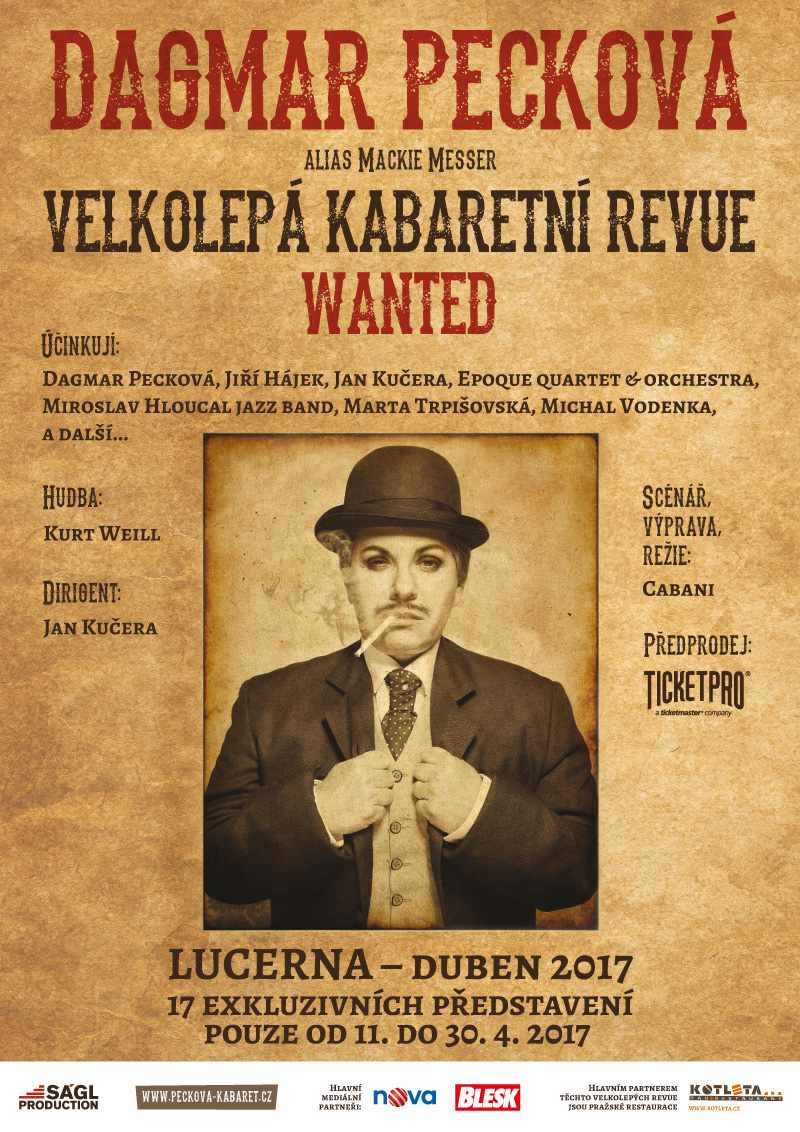

DELICATO CENTRUM a.s. is registered under file number B 15988, which is filed with the Municipal Court in Prague
IČO: 29039983, Registered office: Jeseniova 1196/52, Žižkov, 130 00 Prague 3
Copyright © 2007 – 2026 SÁGL PRODUCTION s.r.o.


